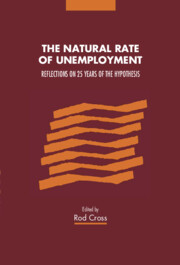Book contents
- Frontmatter
- Contents
- List of Contributors
- Preface
- 1 Introduction
- Part I The theoretical framework
- Part II Adjustment, ranges of equilibria and hysteresis
- Part III Empirical tests and macro models
- Part IV Political economy
- 15 Is the natural rate of unemployment a useful concept for Europe?
- 16 The natural rate of unemployment: a fundamentalist Keynesian view
- 17 Politics and the natural rate hypothesis: a historical perspective
- Index
17 - Politics and the natural rate hypothesis: a historical perspective
Published online by Cambridge University Press: 03 May 2011
- Frontmatter
- Contents
- List of Contributors
- Preface
- 1 Introduction
- Part I The theoretical framework
- Part II Adjustment, ranges of equilibria and hysteresis
- Part III Empirical tests and macro models
- Part IV Political economy
- 15 Is the natural rate of unemployment a useful concept for Europe?
- 16 The natural rate of unemployment: a fundamentalist Keynesian view
- 17 Politics and the natural rate hypothesis: a historical perspective
- Index
Summary
Why does one economic idea or theory replace another? Why are some ideas discarded and others accepted or retained? Why are some apparently false notions brought back to centre stage some years later? These are difficult questions for economists to answer. The use of models of the development of science, such as those propounded by Popper or Kuhn or Lakatos are increasingly found wanting as explanations of the actual development of economic ideas and other approaches to the subject are increasingly advocated. It is not my purpose here to add to this literature, but rather to suggest that by looking at the politics of economic theory we can gain a useful insight into its development. By the ‘politics of an economic theory’ I shall mean both the political (policy) implications of a particular theory and the way in which political considerations may plausibly be said to have led to the statement of and the acceptance of that theory. Our specific concern is with the theory of the natural rate of unemployment (NRU).
Few would doubt that economics has made truly enormous strides since the end of the Second World War in the ‘scientific’ content of its endeavours. The typical economist is now far better equipped, both to undertake formal model construction and to subject these structures to sophisticated estimation procedures, than ever before. Of this there can be no doubt and the rate of growth of the scientific study of economic phenomena seems to be accelerating.
- Type
- Chapter
- Information
- The Natural Rate of UnemploymentReflections on 25 Years of the Hypothesis, pp. 362 - 373Publisher: Cambridge University PressPrint publication year: 1995
- 1
- Cited by

